Simon and I had a fantastic journey through Japan, or at least the east coast of Honshu. We started in Tokyo, then took bullet trains to Hiroshima, Himeji, Kyoto, and Mount Fuji before heading home. Along the way I presented my newly-translated manga, Open Borders, at the University of Tokyo, hung out with the flourishing Scott Alexander fan group, met up with Simon’s first Japanese tutor, and talked to a lot of locals and fellow visitors. I dislike travelling alone, but thanks to homeschooling I had a great travel buddy for a trip I’ve been waiting decades to experience.
My top thoughts on Japan:
There is way more English in Japan than I expected. Even far outside of tourist areas, many business signs are only in English. Workers in hotels, restaurants, and train stations had no trouble helping us. Even random people’s English was pretty good, probably better than in Sicily.
As you may have heard, 90-95% of natives still mask outdoors. Before I left, I ran this Twitter poll.
The “escalators” turned out to be totally wrong. I walked around Japan mask-free like I owned the place. Despite their own mask fanaticism, the Japanese barely even raised their eyebrows at us. (Yes, some say that reflects our poor ability to read subtle Japanese reactions. But if so, so what?) Unlike in Italy this summer, even train employees left us completely alone. Buffets are the sole place in Japan that enforces mask rules - plus a plastic glove requirement that I’ve seen nowhere else on Earth.
It’s tempting to blame Japanese mask-wearing on their extreme conformity. What struck me, though, was that at least 80% of Westerners in Japan also wore masks outside. While the Japanese are almost surely higher in conformity, the typical Westerner is only marginally more non-conformist. While you could cite self-selection, Westerners often removed their masks around us. Tyler has spent decades telling me that despite my self-conception, I’m just a normal suburban guy, but being in Japan confirms that I’m aberrant even for a Westerner.
I always try to go to non-tourist grocery stores to look for disparities between official and actual GDP per capita. Japanese grocery stores are very good. Not quite as cornucopian as American grocery stores, but competitive with Germany, Britain, and France, superior to Spain and Italy, and vastly better than anything I saw in Scandinavia. If you love Asian food - which I don’t - Japanese grocery stores are arguably the best in the world. Even the milk was top-notch and readily available, surprising in a lactose-intolerant land.
Many friends praised Japanese convenience stores before I left. 7-11 food in Japan is like fish-and-chips in the UK: ubiquitous good quality fare, but it gets monotonous after a while. Simon loved the sushi places, so I humored him. While Japan has every kind of restaurant, their menus are strangely segregated: most sushi places only sell sushi, most noodle places only sell noodles, and so on. Scoff if you must, but my favorite place to eat in Japan was the Italian chain Saizeriya.
According to official data, generalized trust in Japan is actually a little lower than in the United States. After my visit, I say with confidence that while Japanese trust may indeed be mediocre, Japanese trustworthiness is sky-high. Despite a near-absence of public trash cans, the streets are as clean as Disneyland’s. There’s no tipping, but the quality of service is the probably highest I’ve ever encountered. When we couldn’t find a bus, a random woman helped us, then hunted us down ten minutes later to make sure we were doing OK.
Wait, why are public trash cans almost non-existent? Terrorism! In perhaps the most absurd act of security theater in history, Japan got rid of trash cans after the 1995 sarin gas attack, even though the terrorists didn’t even use trash cans as a delivery mechanism:
In March 20th, 1995 during the morning rush hour, the Tokyo subway system fell victim to a deadly terrorist attack using extremely lethal sarin gas. This attack was organized by cult members of Aum Shinrikyo and injured over 5,000 people. Because sarin gas has no scent and is also colorless, many affected by the attack did not realize until they began having symptoms later on.
Although the cult members were eventually arrested, many were scared of further attacks. To ease these fears, trash cans were taken out of many public areas (especially train stations) because they could potentially hold terrorist weapons.
Fast forwarding to now, over 20 years later, Tokyo still has very few trash cans and train stations are still always on alert for suspicious items or anything that could be possibly linked to further incidents.Japan’s transformation from one of the most militaristic countries in history to one of the most pacifistic countries in history should shock even the most dogmatic believer in “Deep Roots.” You could save the theory by insisting that Japan has deep roots for conformity rather than militarism: The Japanese are hawks in a hawkish society and doves in a dovish society. But that’s awfully ad hoc. (No pun intended). The same goes for trustworthiness; after all, in the first half of the twentieth century, Japan executed two of the most famous sneak attacks of all time.
Despite the incredible trustworthiness of modern Japan, my contacts told me that pre-Covid, Japanese companies uniformly required a human to receive all deliveries. That’s right, they stubbornly refused to just leave packages on doorsteps. Since Covid, this rule has relaxed, but I was told that getting Japanese Amazon to simply leave a package has a near-random 50/50 success rate. What’s the problem? My best story is that despite the near-absence of property crime, Japanese companies fear that a single stolen delivery will bring them grave dishonor.
This massive inconvenience is clearly a big blow to e-commerce. (Stats do vary widely, but Japan lags by almost any per-capita measure). The flip side is that Japanese retail is vibrant, like going to malls in the late 80s or early 90s. Cool for tourists who come to marvel at Electric Town; aggravating for actual residents.
The Japanese translation of Open Borders came out just two months ago. While Japan is notoriously closed to immigration, the businesspeople and expats I met told me that getting work visas is fairly easy - at least for high-skilled workers. An IT mogul remarked that the process is so streamlined that he stopped using an immigration lawyer. A Russian IT worker said that even after the Ukraine War, Russian STEM workers can easily get in. Japan’s foreign-born share is only about 3%, but that’s roughly tripled since 1990. Japan won’t have open borders anytime soon, but the foreign-born share could easily triple again by 2050.
As you may have heard, Japan is packed with vending machines. There are a lot of stories about this, but low crime is the most straightforward explanation. Isolated outdoor vending machines in the U.S. would get vandalized or robbed. Very rarely so in Japan.
How low is Japanese crime? The murder rate is around .3 per 100,000 - about a third of the German rate and about 5% of the current U.S. rate. Property crime in Europe may actually be even worse than in the U.S., but there is little doubt that Japan’s violent and property crime rates are both ultra-low. All this in a country that continues to glorify the world-famous murder-suicide vendetta of the 47 ronin.
Suppose Japan had stayed out of World War II, keeping peace with the U.S. and European colonial neighbors. If so, I can easily imagine modern Japan being a richer and much more powerful version of North Korea, ruled by a hereditary God-Emperor. The conformist culture that keeps Japanese crime low also fosters popular and durable deference to absurd overreactions to terrorism and Covid, not to mention murdering and enslaving many millions from the start of the First Sino-Japanese War in 1894 to the end of World War II in 1945.
For my son, the highlight of the whole trip was a visit to the Pug Cafe in Kyoto. Which is just what it sounds like.
Overall, a thrilling odyssey. Dirt cheap, too, due to the weak yen and ongoing depression of the Japanese tourism industry. Now is is the time to go. I’d be happy to return another five times to see the other side of Honshu and the other three islands.
P.S. Shout-outs to Ilya Somin for connecting me to the University of Tokyo, Simon Cranshaw for meeting us at the airport, Akira Inoue, Motoki Miura, and Naoya Nagaishi for hosting us at the University of Tokyo, Eiji Matachi, the Japanese translator of Open Borders, Harold Godsoe, Andrew Gaul, and everyone else at ACX Tokyo, and Jackson Lawson, Simon’s first Japanese teacher, who now works in Kyoto.
Subscribe to Bet On It
Caplan and Candor

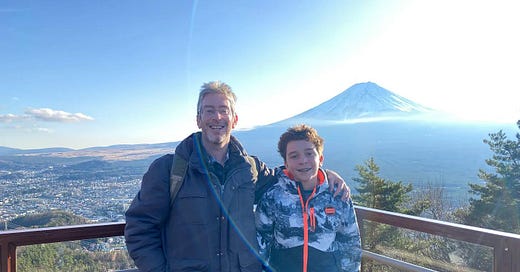






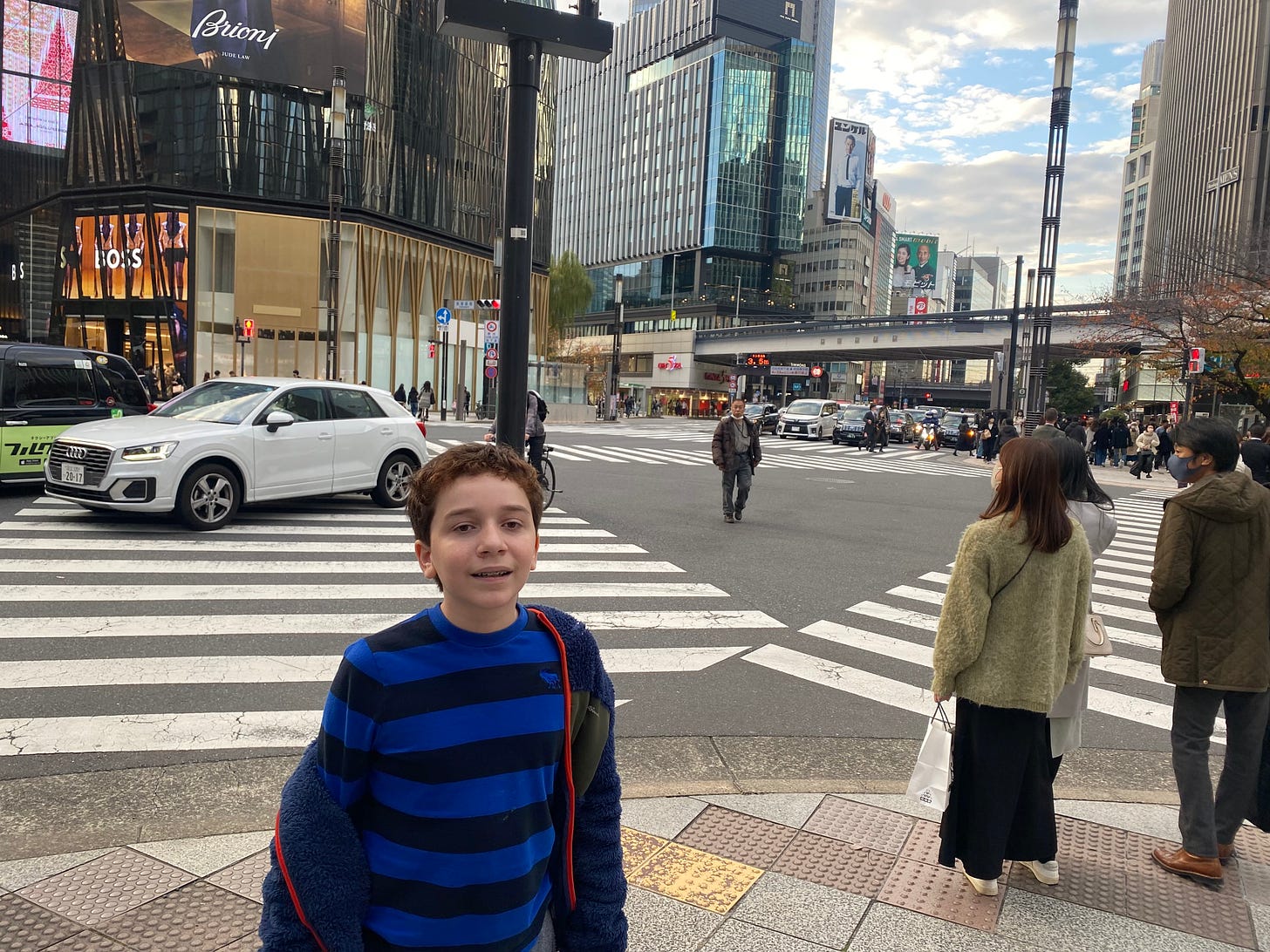

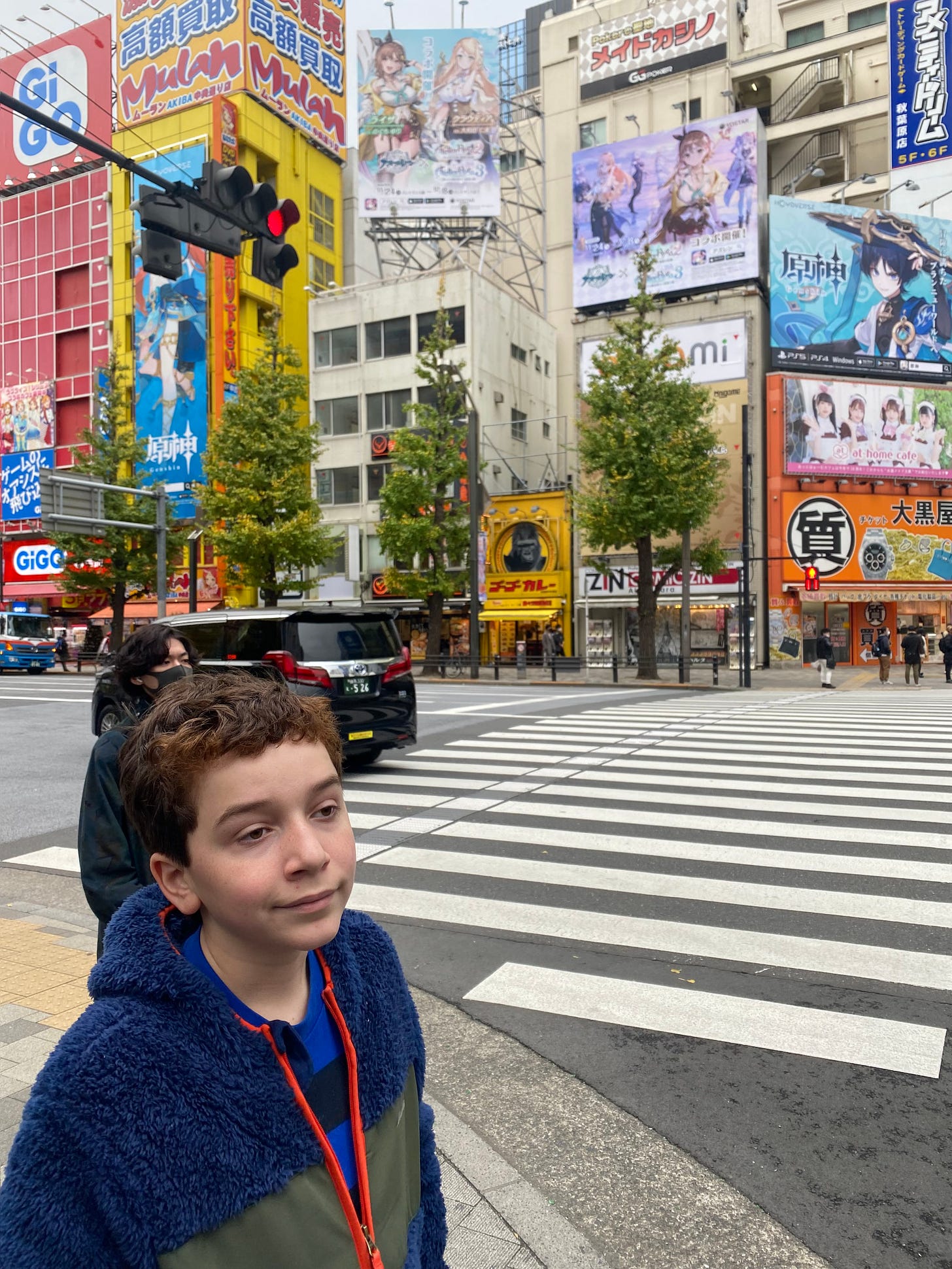


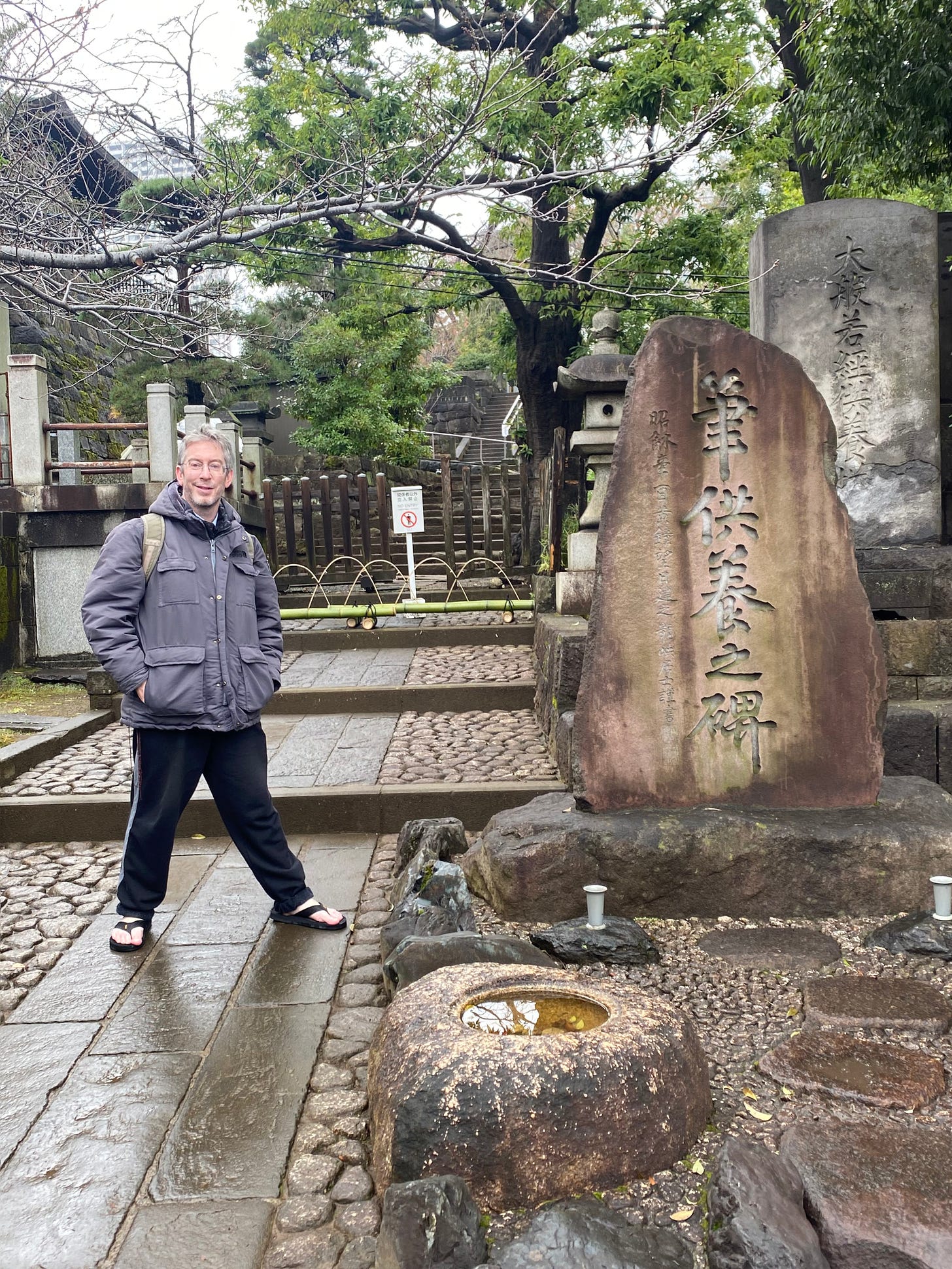
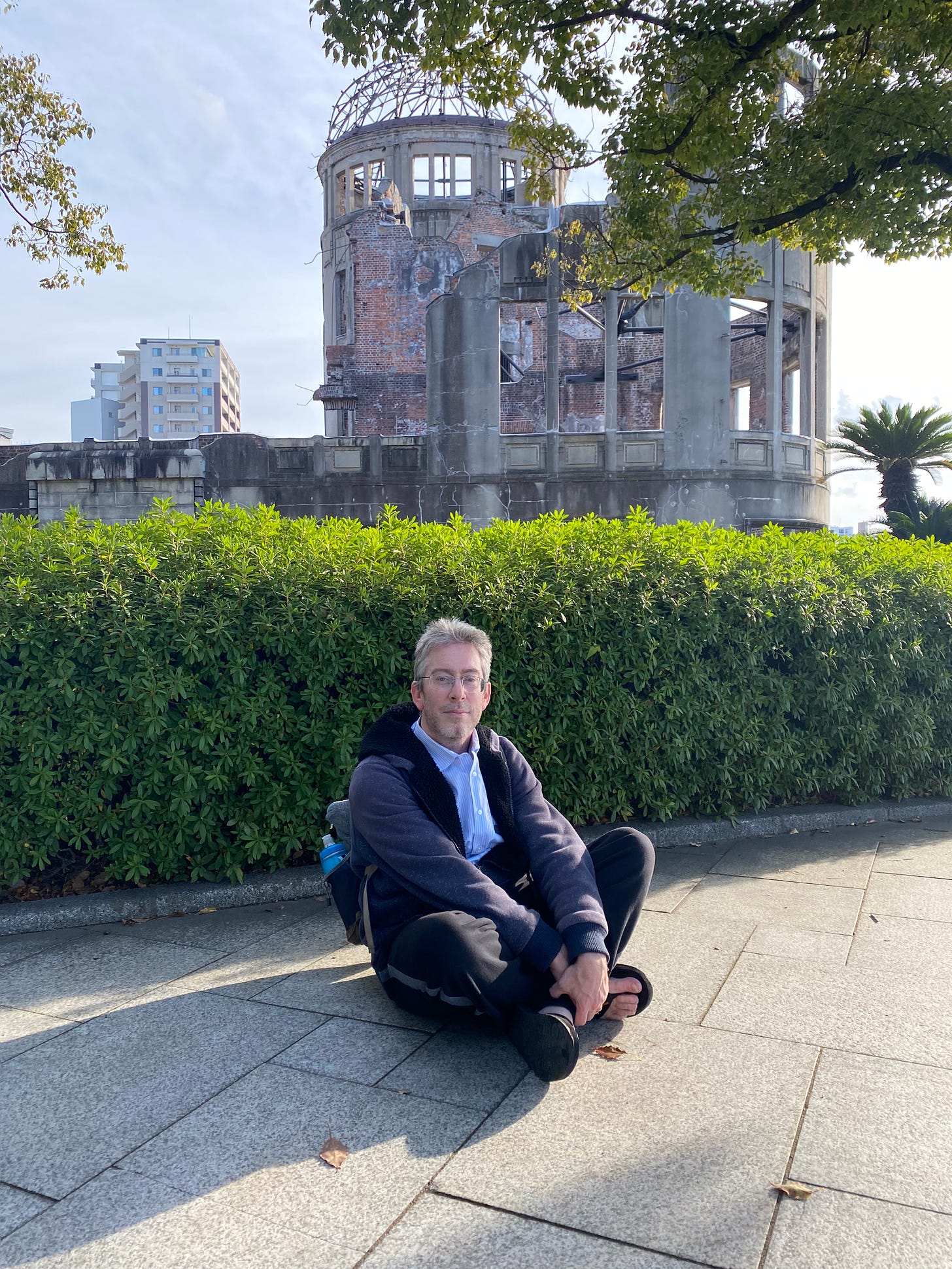

Thanks for the post.
1) I was in Japan a long time ago, but my general impression is that they held foreigners to a lower standard of behavior. "Of course those degenerate foreigners wouldn't mask." Combine this with a non-confrontational attitude and a feeling that tourists are not some kind of permanent problem and basically they just let it go and keep their disapproval internal.
This isn't a problem if you're a visitor but can be more of a problem if you tried to live and work in Japan, especially if you weren't a special person in any way. One reason there is such a low % of people who move permanently to Japan is they figure this out. That internal disapproval will later come out in lots of passive aggressive ways.
2) I'm not sure what the difference between "trust" and "trust-worthiness" is supposed to be.
3) I don't see what "trustworthiness" has to do with Pearl Harbor.
Obviously, Japanese are trustworthy to "insiders". The people in the attack fleet could all trust each other to do their duty and not send a message to Washington. They could trust each other to risk death for their comrades.
Japanese trustworthiness is a kind "state capacity". What that capacity gets used for is contextual.
4) Japan has never been averse to high skill immigration, but not many high skill people want to immigrate there because of #1. I don't think, and remain hopeful, they won't make the same mistake with low skill immigration that Sweden did.
5) I tend to think the internal dynamics of Imperial Japan made war with China inevitable, but it might not have been with the west.
As to what it might look like, aren't places like South Korea or Taiwan good examples. These were authoritarian states focused on technocratic capitalism with fake or severely curtailed democracies (in many ways Japan too, which has been dominated by the LDP in a so called "one and a half party system").
About Japan being one of the most militaristic countries in the world, I don't think that "militaristic" represents any kind of deep human feature, but the superficial product of other deeper features. Japanese people are not "otakuistic", but they collectively have some characteristics that manifest in being otaku. At least some of them.
Modern military forces rely on discipline. Drill and drill and more drill. Trust your comrades, trust your superiors.
I don't think Japanese people were ever "militaristic", they were simply disciplined and trustworthy. Were the Japanese people too trusting in their military elite, a very aggressive elite to be sure, that lead them into an expansionist war? Sure. But that is different from saying that Japanese people were militaristic and are now pacifistic.